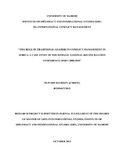| dc.description.abstract | Traditional leaders have been involved in solving conflicts in Africa for many decades yet
their input in international conflict management have not been documented widely compared to
the modern conflict management techniques. These leaders are still highly respected and used in
conflict management in Africa and Asia compared to the European States, therefore their input in
conflict management should not be overlooked, instead they should be encouraged, facilitated and
included especially in mediation to be able to have local ownership of peace processes. Somali
Peace Process held at Mbagathi, Kenya proved to be a good case study since Somali is one of the
African communities which still hold their traditional leaders in high esteem and still use these
leaders in indigenous conflict management institutions such as Shari’a courts to solve disputes
between clans, sub-clans and at the rural areas where modern institutions of conflict management
are few. The main purpose of this study was to do a critical analysis of the role of traditional leaders
in mediation, look at their importance in conflict management and propose recommendations that
would contribute to strengthening the use of traditional leaders in international conflict
management.
The research findings were based on broad literature review and were supplemented with
focus group discussions, informant interviews and questionnaires. Different categories of
respondents were interviewed on the role of traditional leaders in conflict management; Traditional
and religious leaders, political leaders, representatives from Non-Governmental Organizations
(NGOs), academicians, civil societies and special groups (involving the Somalis in Diaspora).
The study established that traditional leaders have continued to be fundamentally involved
in mediation of communal conflicts in Africa since most conflicts in Africa are as a result of
unequal distribution of resources, widespread corruption and ethnicity. The study acknowledged
that traditional leaders role in mediation has been successful in peace processes citing the Borama
Conference in Somaliland as an example. Furthermore, the study found out that the role traditional
leaders in mediation has not been given enough support and recognition by the international
community hence weakening their role in international conflict management. The study realized
that despite the continued support for the use of traditional leaders in mediation, most societies
have also disregarded them terming their techniques as old fashion ideologies due to the presence
of modern practitioners of mediation and conflict managers.
The study concluded by giving some recommendations on how the role of traditional
leaders can be strengthened in international conflict management. The study recommended
international recognition of these important leaders in mediation processes, facilitation of the role
of traditional leaders in conflict management and more research by conflict management scholars
on traditional leaders input in international conflict management. | en_US |

